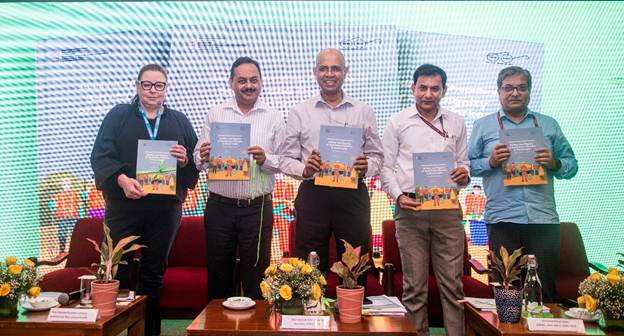National Rural Sanitation Workshop Sets the Stage for SBM-G’s Next Phase
Delivering the keynote address, Shri Ashok KK Meena, Secretary, DDWS, highlighted that sanitation is not just an infrastructural necessity but a human right rooted in dignity, equity, and climate consciousness.

- Country:
- India
In a pivotal move to steer India’s rural sanitation journey into its next transformative phase, the Department of Drinking Water and Sanitation (DDWS) under the Ministry of Jal Shakti, in partnership with UNICEF India, hosted the National Rural Sanitation Workshop at the India Habitat Centre, New Delhi. This high-level gathering brought together senior government officials, state mission directors, Panchayati Raj leaders, development partners, and sanitation sector experts to evaluate progress under the Swachh Bharat Mission – Grameen (SBM-G) and align on future priorities.
Marking a decade of SBM-G, the workshop reaffirmed the Government of India’s steadfast commitment to sustainable, inclusive, and climate-resilient sanitation systems, especially in the face of growing environmental and equity challenges.
Anchoring Sanitation in Dignity, Climate Adaptation, and Local Governance
Delivering the keynote address, Shri Ashok KK Meena, Secretary, DDWS, highlighted that sanitation is not just an infrastructural necessity but a human right rooted in dignity, equity, and climate consciousness. He emphasized that the next decade of SBM-G must sustain the collective momentum of the past while ensuring no one is left behind. He called for anchoring local leadership in the delivery of sanitation services, especially at the Panchayat level, ensuring accountability, sustainability, and adaptability to local challenges.
The event marked the release of two significant technical documents:
-
Standard Operating Procedures for the Safety and Dignity of Sanitation Workers in Rural India
-
Protocol for Developing Climate Resilient Sanitation Technical Designs and Services
These publications offer critical guidance for making sanitation workforces safer and systems more robust against climate-induced stresses such as flooding, droughts, and extreme weather patterns.
UNICEF and Mission Directors: Transitioning Toward Future-Ready Sanitation
Karina Malczweska, Chief of WASH & CCES, UNICEF India, welcomed delegates with a compelling call to shift from inclusivity to resilience in sanitation. She underscored the importance of aligning sanitation systems with the United Nations Sustainable Development Goals (SDGs) and India’s broader rural development framework.
Shri Kamal Kishore Soan, Additional Secretary and Mission Director, JJM & SBM-G, emphasized that the workshop served as a platform for reflection and recalibration. He reiterated that while sanitation coverage metrics are encouraging, functionality, pace, and quality must evolve together. In an era of rising climate risks, he noted, resilience is not optional—it is essential.
Empowering Panchayati Raj Institutions: The Backbone of Rural Sanitation
In a session led by Shri Sushil Kumar Lohani, Additional Secretary, Ministry of Panchayati Raj (MoPR), the focus turned to the pivotal role of Gram Panchayats (GPs) in sustaining sanitation outcomes. He highlighted how over 2.5 lakh Panchayats are now using the e-GramSwaraj platform to develop thematic development plans and track progress using the Panchayat Advancement Index.
Initiatives like Clean and Green Panchayat are empowering local bodies to:
-
Lead waste management and 100% waste segregation
-
Promote greywater reuse and eco-friendly practices
-
Build inclusive sanitation infrastructure
-
Showcase best practices from award-winning Panchayats for replication
Such localized action, backed by real-time monitoring and digital tools, is helping rural India transition from ODF (Open Defecation Free) to ODF Plus with measurable and sustainable outcomes.
Progress Update: SBM-G Snapshot Across States and UTs
The workshop presented a comprehensive review of SBM-G’s implementation status:
-
80% of targeted villages have achieved ODF Plus Model status, though only 54% are verified, highlighting a gap in third-party assessments.
-
Greywater Management coverage has hit a national average of 91%, with over 20 States/UTs crossing 95%.
-
Solid Waste Management coverage now stands at 87%, showing substantial growth in rural solid waste handling infrastructure.
-
Plastic Waste Management has reached 70% block-level coverage, though functionality and sustainability remain areas needing focused attention.
The review emphasized the importance of cross-sector convergence, community behaviour change, and sustained monitoring to move toward total sanitation.
Vision for the Future: Climate-Smart, Equitable, and Locally Anchored
As SBM-G evolves, its new direction is clear: it must be climate-smart, equitable, and rooted in local governance. The government aims to integrate climate resilience into every aspect of sanitation service delivery—from infrastructure to workforce safety.
Furthermore, the integration of tools like the Panchayat Advancement Index and e-GramSwaraj enables data-driven planning and performance tracking at the grassroots level, ensuring that local bodies remain in the driver’s seat.
The renewed mission underlines five core principles:
-
Equity and Inclusion – Ensuring every individual, especially marginalized groups, benefits from sanitation services.
-
Climate Adaptation – Designing and maintaining systems that withstand climate-related shocks.
-
Local Leadership – Empowering Panchayats to lead planning and implementation.
-
Sustainability – Promoting systems that are functional, community-owned, and long-lasting.
-
Integrated Convergence – Aligning with other national missions such as Jal Jeevan Mission, MGNREGA, and Health and Nutrition initiatives.
A Decade On, SBM-G Looks to a Cleaner, Greener Tomorrow
As Swachh Bharat Mission – Grameen (SBM-G) completes a decade of transformative impact, the National Rural Sanitation Workshop served as a powerful reminder of how far the country has come—and how much further it must go. The path ahead is clear: to institutionalize sanitation as a pillar of public health, climate resilience, and rural prosperity.
With state and central alignment, development partner support, empowered local bodies, and community ownership, India’s sanitation journey is poised to enter its next bold chapter—cleaner, healthier, and more resilient than ever before.










